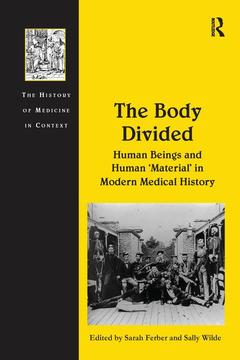The Body Divided Human Beings and Human 'Material' in Modern Medical History The History of Medicine in Context Series
Auteur : Wilde Sally
Coordonnateur : Ferber Sarah

Date de parution : 09-2016
15.6x23.4 cm
Date de parution : 01-2012
15.6x23.4 cm
Thèmes de The Body Divided :
Mots-clés :
benevolent; asylum; helen; macdonald; dissecting; room; anatomy; act; melbourne; australian; Sydney’s Australian Museum; Intra-ocular Lenses; Plaster Of Paris; Young Men; Melbourne Benevolent Asylum; Supplier Induced Demand; Renal Replacement Therapy Patients; Benevolent Asylum; Anatomy Act; Therapeutic Cloning; Human Reproductive Cloning; Dissecting Rooms; Melbourne Hospital; Reproductive Cloning; Anatomical Exhibitions; Yarra Bend; Corneal Transplants; South Australian Museum; Bosom Friends; SCNT; Somatic Cell Nuclear Transfer; Thanksgiving Service; Anatomical Examination; Eye Banks; Aboriginal Crania



